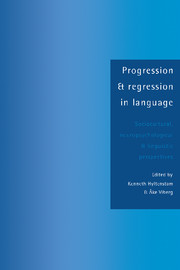 Progression and Regression in Language
Progression and Regression in Language Book contents
- Frontmatter
- Contents
- List of contributors
- Preface
- INTRODUCTION
- THE SOCIOCULTURAL SETTING
- 2 The role of pidgin and creole languages in language progression and regression
- 3 Structure and practice in language shift
- 4 Growing up monolingual in a multilingual community: how language socialization patterns are leading to language shift in Gapun (Papua New Guinea)
- 5 Language change in a creole continuum: decreolization?
- PSYCHO- AND NEUROLINGUISTIC ASPECTS
- THE LINGUISTIC PERSPECTIVE 1: DISCOURSE, GRAMMAR, AND LEXIS
- THE LINGUISTIC PERSPECTIVE 2: PHONOLOGY
- Index
3 - Structure and practice in language shift
Published online by Cambridge University Press: 06 July 2010
- Frontmatter
- Contents
- List of contributors
- Preface
- INTRODUCTION
- THE SOCIOCULTURAL SETTING
- 2 The role of pidgin and creole languages in language progression and regression
- 3 Structure and practice in language shift
- 4 Growing up monolingual in a multilingual community: how language socialization patterns are leading to language shift in Gapun (Papua New Guinea)
- 5 Language change in a creole continuum: decreolization?
- PSYCHO- AND NEUROLINGUISTIC ASPECTS
- THE LINGUISTIC PERSPECTIVE 1: DISCOURSE, GRAMMAR, AND LEXIS
- THE LINGUISTIC PERSPECTIVE 2: PHONOLOGY
- Index
Summary
INTRODUCTION
During the last 20 years anthropologists have focused their attention on how human cultures are produced and reproduced through the ‘interested action of historic agents’ (Sahlins, 1985), often glossed as ‘practice.’ They have shown that neither the mental ‘rules’ explored by structuralist scholarship, nor the ‘hegemonic forces’ proposed by students of political economy, seem to be determinant on these practices.
Students of language death have shown that two sets of phenomena that we might describe as ‘structural’ are frequently linked: the profound subordination of a minority population at the political-economic level, and a set of linguistic phenomena including attrition of form through rule loss and simplification until productivity is lost, and functional attrition until what was once the dominant language of the group is no longer acquired by children. A central problem is: How can political economy articulate with language? No matter how powerful the agents of oppression, we have no evidence that they can enforce practices like ‘freeze derivation in the fifth position of verbal prefixation’ or ‘shift from ergative to nominativeaccusative marking of arguments’ or ‘use honorific marking only in direct address’. Except in especially pathological situations (boarding- schools, for instance), we have no evidence of direct regulation of functional allocation of the minority language either: The agents of oppression may say ‘do not speak your language any more’, but they certainly do not say, ‘restrict use of your language to the recitation of myths’, or ‘use it only to tease other people your own age’.
- Type
- Chapter
- Information
- Progression and Regression in LanguageSociocultural, Neuropsychological and Linguistic Perspectives, pp. 68 - 93Publisher: Cambridge University PressPrint publication year: 1994
